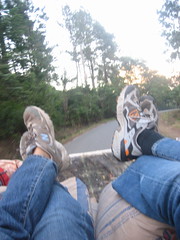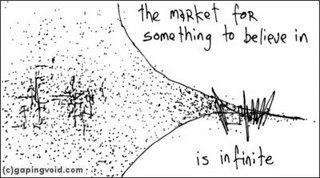 People ask what Peace Corps was like and a stock response I employ is "It was an emotional roller coaster, but worth it." No other job hurtles faster from triumphant ecstasy to heartbreaking defeat. No other lifestyle charms as effectively as it disappoints. Let's take a look at an exultant peak and a bitter valley from this volunteer's experience in the Dominican Republic.
People ask what Peace Corps was like and a stock response I employ is "It was an emotional roller coaster, but worth it." No other job hurtles faster from triumphant ecstasy to heartbreaking defeat. No other lifestyle charms as effectively as it disappoints. Let's take a look at an exultant peak and a bitter valley from this volunteer's experience in the Dominican Republic.Roasted coffee sales were booming at the cooperative we assisted. Claudette had designed a snazzy new logo and packaging for our organic, high altitude coffee. The operations manager saw that roasted coffee could be a savior for our over-indebted loss-making enterprise. The opportunity that roasting our coffee was vastly more profitable than selling the raw commodity had sunk in for her. For the Asociación de Caficultores de Jarabacoa (ASCAJA) and the small farmers it represents, that's the difference between $1.25/lb for green coffee and $4-$5/lb. Although our costs are higher for a finished product (fuel, labor, and packaging), it still beats our red ink splattering commodity business. Plus, it increases employment in a country where good work is hard to find.
So the orders were rolling in. We were selling to volunteers in the Peace Corps office, employees of the US Embassy in Santo Domingo, artisan fairs, and several Americans entrepreneurs marketing the coffee to tourists. At one point over the summer of 2008, we even ran out of coffee to roast and had to borrow some from another buyer in town. Our limited roasting capacity became a problem. Our "sample" size roaster, capable of roasting only eight pounds at a time, couldn't cope with our projections of hundreds or even thousands of pounds per month. For any struggling business, growth problems are good to have.
Luckily, there was a seed sown in rocky soil nearby. USAID (or another development agency) had donated an eighty-pound drum roaster to a rural farmers group associated with ASCAJA. The machine was rusting in their warehouse from disuse. The donor agency had no doubt hoped to initiate some of the economic benefits of commodity processing I described above. The problem was that no local human capacity existed to market the finished product. These are simple farmers who are mostly illiterate and innumerate. The area has no electricity or phones. These are not exactly fertile conditions for a thriving startup roasted coffee business. The machine also didn't work as delivered, requiring major welding and drilling modifications to function. Dumping broken machines into places they can't be used with no training or followup is standard Big Development practice.
As educated outsiders, Peace Corps volunteers see problem-opportunity sets like these as gleaming nuggets in the muddy pan of routine daily experience. The downside is that nugget might turn out to be fool's gold.
I thought we could bring the eighty-pound roaster down from its isolated mountain community to the ASCAJA factory in town, where it could be put to good use filling roasted coffee orders as its donors intended. The group wouldn't part with their machine easily, holding out hope that orders might suddenly materialize. ASCAJA couldn't afford to purchase it, given their dire financial situation. The solution: pay the group a usage fee per pound roasted minus repair costs to get it running. Brilliant!
It was a fair compromise that kept everyone's interests aligned -- when sales are high, usage fees are high, and when sales are low, fees are low. This incentive structure avoids yoking ASCAJA to a fixed monthly lease payment that could be a burden in lean times. At this point a seasoned volunteer might look down the nose of their miner's spectacles and wonder if this elegant win-win solution has the sheen of fool's gold. That veteran (for once) would be wrong.
I traveled to Jumunuco on the back of a motorcycle down the rutted dirt roads. Flying past rolling hills of pine forest, golden pasture, and shaded coffee I learned my driver is the son of one of our board members. Knowing I was integrated enough to know my motoconchista was a good omen.
I entered the simple concrete block warehouse to introduce myself. Most of the men looked familiar to me and I to them, even if we didn't know one another by name. They all come to the factory office with their coffee and saw me plugging away at the cooperative's accounting. The recognition felt good. My presence, if not well understood, was at least noticed.
I explained the production bottleneck preventing us from reaching our potential in the roasted coffee business. I pointed out the roaster lying unused in the corner. I urged them to have the entrepreneurial vision to see problems as opportunities. I explained what was in it for them: a usage fee for their machine and a higher and better use for their green coffee. I repeated myself and spoke as slowly and clearly as possible so they could understand my accent. I referenced popular culture in illustrative examples. I mustered all my training and all my cultural understanding to make a deal happen.
And they understand! They agree! We reach consensus on terms, and I promise to draw up the contract. A success like this is one of the highlights of a volunteer's career. It's also Peace Corps development philosophy at its finest -- not writing checks and building stuff but instead educating, communicating, and removing the blockage and waste that prevents people from reaching their potential. Oh, triumphant success! Oh, sweet, sweet victory.
These achievements make one forget all the loneliness, humiliation, and confusion that form the warp of the volunteer's fabric of experience. The pain is forgotten, and, through forgetting, one melts a bit more into the collective moral community that characterizes traditional rural society. One thinks, "I finally get these people and they get me! I've acculturated. I've integrated." This feeling of becoming whole and integrated, to not fractionate oneself into American parts and host country parts, but to feel wholly American and wholly native to the place is Peace Corps Nirvana.
Buddhists say the surest sign you've not reached enlightenment is to believe you have. In other words, if you see the Buddha on the road, kill him. My smug feeling from securing the larger roaster was a fleeting illusion cemented by my desire to fit in, and to be a good volunteer. A good Buddhist would notice my attachment to success and remind of the second Noble Truth: suffering is caused by desire. As per usual when breaking a universal truth, a cosmic smackdown was in order.
Like all proper cosmic smackdowns, this one took me by surprise. We were waiting for a hitched ride down the mountain when a large Isuzu work truck stopped for us. The two men in the cab motioned my beautiful wife up front while I climbed into the bed. I set my backpack in the puddled wet bed while I stood hanging onto the bar that runs behind the cab. Standing was my custom for bolas (what we call hitched rides in the DR) to provide optimal scenery viewing, wind-through-the-hair, and leaning into the sharp mountain curves as if carving down the hill on a six-ton snowboard.
The reverie of my slalom through tropical scenery stuttered. I caught a whiff of diesel fuel. I thought, "Must be some engine fumes." I noticed the odor several times, and continued to ignore it. Unburnt diesel didn't fit the joyous high of my recent roaster achievement.
Little did I know, the wet puddles were spilled diesel and that sticky dead dinosaur juice was soaking through my entire backpack, making a blotchy chromatography experiment out of my important papers. I shouldered my pack and promptly soaked my lower back with fuel. Now the fumes were undeniable. I was a walking oil spill.
I began to cycle between rage and dejection. My backpack, laptop case, papers and shirt were covered with sticky hydrocarbons. Feverish efforts to wash the pack with detergent and water proved futile. (Geeky aside: Since then I've learned a polar solvent like water doesn't work on nonpolar chained hydrocarbons like diesel fuel. Dry cleaning fluid would have been better.) I asked my Dominican friends at the factory how I could get the fuel out. Feeble replies to wash it and put it in the sun didn't satisfy. They were really thinking, "Best remedy for diesel fuel is don't get soaked with it in the first place, pendejo."
These minor snafus can precipitate extreme existential anguish in the volunteer. We construct mental dams to hold back the days, weeks, and months of stress and awkwardness we feel. Then a neighbor's goat devours the garden, a bat crawls up your calf, or your backpack is soaked in diesel. Right then the camel's spinal column shatters and life doesn't seem worth living. Your American upbringing just doesn't prepare for this stuff. You think, "This would never happen to a Dominican," and you're right.
The good news is such suicidal moments are as short as they are frequent. Moments later you might be treated to a delicious lunch of barbecued pork ribs, eggplant salad, and fluffy moro by a family that treats you like one of their own children, a five year old might greet you with a bear hug in the street, or a coworker might tell you she's really learning a ton and she's so glad you're here. The magic of Peace Corps draws you in again. Another ride on the roller coaster?



